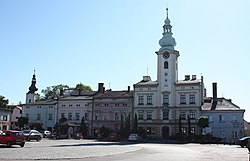Strumień: Difference between revisions
No edit summary |
m Reverted edits by 77.255.176.251 (talk) to last version by Yobot |
||
| Line 1: | Line 1: | ||
{{Infobox settlement |
{{Infobox settlement |
||
| name = Strumień |
| name = Strumień |
||
| image_skyline = |
| image_skyline = Strumień Rynek z ratuszem.jpg |
||
| image_caption = |
| image_caption = Fragment of town square with Town Hall |
||
| image_shield = POL Strumień COA.svg |
| image_shield = POL Strumień COA.svg |
||
| pushpin_map = Poland |
| pushpin_map = Poland |
||
Revision as of 20:43, 2 August 2011
Strumień | |
|---|---|
 Fragment of town square with Town Hall | |
| Country | |
| Voivodeship | Silesian |
| County | Cieszyn |
| Gmina | Strumień |
| Founded | 13th century |
| Town rights | 1482 |
| Government | |
| • Mayor | Anna Agnieszka Grygierek |
| Area | |
• Total | 6.45 km2 (2.49 sq mi) |
| Population (June 2008) | |
• Total | 3,502 |
| • Density | 540/km2 (1,400/sq mi) |
| Time zone | UTC+1 (CET) |
| • Summer (DST) | UTC+2 (CEST) |
| Postal code | 43-246 |
| Car plates | SCI |
| Website | http://www.strumien.pl |
Strumień [ˈstrumjɛɲ] ⓘ (Template:Lang-de, Template:Lang-cs) is a town and the seat of Gmina Strumień, in Cieszyn County, in the Silesian Voivodeship (province) of southern Poland, on the Vistula River.
Currently situated in the Silesian Voivodeship (since 1999), Strumień was previously part of the Bielsko-Biała Voivodeship (1975–1998).
It is located in the north-eastern part of the historical region of Cieszyn Silesia and is the smallest town of Cieszyn Silesia and one of the smallest in Poland.
History
Because of its proximity to the Vistula, this little town has found itself under various national and imperial jurisdictions (see Duchy of Cieszyn). The town existed under Austrian dominion from 1653 until the end of the First World War and was referred to in German as Schwarzwasser. The town with its Polish name Strumień joined the Second Polish Republic in 1920. Following the invasion of Poland and the annexation of Cieszyn Silesia by the German army in 1939, it became part of Nazi Germany (as Schwarzwasser again). At the end of World War II the town returned to Poland.
Historical population
According to the Austrian census of 1910 the town had 1,579 inhabitants, 1,513 of whom had permanent residence there. Census asked people for their native language, 824 (54.5%) were German-speaking, and 681 (45%) were Polish-speaking. Jews were not allowed to declare Yiddish, most of them thus declared the German language as their native. Most populous religious groups were Roman Catholics with 1,484 (94%), followed by the Jews with 67 (4.2%) and Protestants with 28 (1.8%).[1]
References
- ^ Ludwig Patryn (ed): Die Ergebnisse der Volkszählung vom 31. Dezember 1910 in Schlesien, Troppau 1912.
External links
49°55′1.5″N 18°45′48.72″E / 49.917083°N 18.7635333°E



